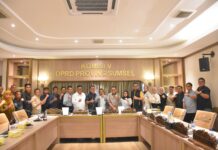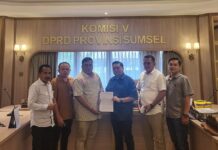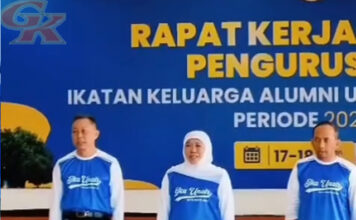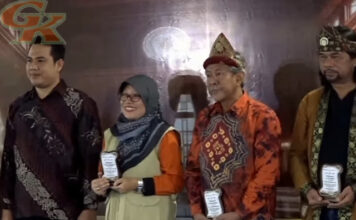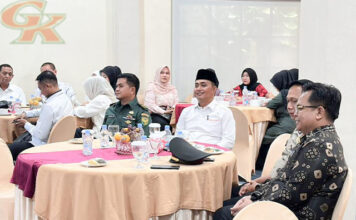JAKARTA, GESAHKITA COM—Reaction Thousands Russians were detained across the country amid protests calling for the release of opposition leader Aleksei Navalny, with riot police cracking down violently on what were Russia’s biggest anti-government demonstrations in years.
Reported that It was unclear what effect the January 23 protests, which stretched across Russia’s 11 time zones amid subfreezing temperatures, would have on the government of President Vladimir Putin, who remains popular and largely without any political rival.
Some media also reported that the Kremlin has engineered constitutional changes that pave the way for him to potentially stay in power until 2036 as Radiofreeeurope wrote on the site.
However, it turnout of tens of thousands of people from Moscow to Vladivostok, who answered Navalny’s call to demonstrate after his jailing following his return a week ago from Germany, showed the attraction of Navalny’s crusade against corruption.
Exactly at midday January 24, more than 3,430 people were reported detained across the country, according to the independent monitoring group OVD-Info. Nearly half of those detentions occurred in Moscow, and included Navalny’s wife, Yuliya, and one of his top allies, Lyubov Sobol, who was forcibly grabbed by police as she spoke to reporters.
Navalny’s detention and the crackdown on his supporters were “troubling indications of further restrictions on civil society and fundamental freedoms,” U.S. State Department spokesman Ned Price said.
EU foreign policy chief Josep Borrell deplored the “widespread detentions” and the “disproportionate use of force.” The bloc’s foreign ministers will discuss “next steps” on January 25, he said in a post on Twitter.
The statements drew a rebuke from the Russian Foreign Ministry, which claimed that the United States had helped incite the protests.
The demonstrations spanned the breadth of the country, beginning in the Far East and Siberia in Khabarovsk, Vladivostok, Novosibirsk, and other cities despite brutal cold and a heavy security presence.
There were various tallies about the nationwide turnout. MBKh Media — an online news organization founded by the exiled Russian businessman Mikhail Khodorkovsky – put the number at 110,000, though other estimates said the number was likely much higher.
Moscow city officials said the crowds that initially packed the city’s central Pushkin Square numbered around 4,000. Reuters and other news organizations estimated that some 40,000 had turned up.
RFE/RL’s Tatar-Bashkir Service reported that authorities in Ufa, the capital of the Russian region of Bashkortostan, arrested protesters at a demonstration attended by more than 3,000 people.
Among those taken into custody were Ruslan Valiyev, the editor in chief of Ekho Moskvy in Ufa, as well as the head of Navalny’s campaign team in Ufa.
In Yekaterinburg, riot police clashed with demonstrators who gathered in temperatures of minus 30 degrees Celsius and pelted police with snowballs.
Navalny has risen to prominence by crusading against government corruption and publishing a series of flashy and snarky investigations that have caught the public’s attention.
After an unsuccessful run to be Moscow’s mayor, he and his allies switched tactics and began promoting a “smart vote” strategy — supporting alternative candidates in local and legislative elections, in a bid to undermine the dominance of Kremlin-allied politicians.
He also been prosecuted for financial crimes, crimes his supporters say were contrived and politically motivated.
In August, while rallying support for his “smart vote” strategy, he fell violently ill and had to be evacuated to Germany, where doctors concluded he had been poisoned with a powerful Soviet-era, military-grade chemical known broadly as Novichok.
After recuperating in a German hospital, Navalny defied Russian government threats and flew back to Moscow on January 17 where he was arrested at the airport.
The day after his detention, a judge ordered Navalny held for 30 days pending a ruling on his suspended sentence that could be revoked and replaced by prison time.
Among other things, authorities accuse Navalny of violating the terms of his parole while he was convalescing in Germany. Navalny and his allies then called for Russians to take to the streets in support of his efforts.
They also stunned many Russians, two days after Navalny’s detention, by publishing an exhaustive two-hour documentary and investigative report showcasing an opulent $1.36 billion palace on the Black Sea that they said belongs to Putin. The video is currently among the most-watched Russian videos on YouTube ever.
Kremlin spokesman Dmitry Peskov has called the investigation a “lie” and a “cut-and-paste job.” Despite the violent crackdown by police, Navalny’s allies remained defiant. Leonid Volkov called for more protests next weekend.(*)
Source : RFE/RL correspondent Matthew Luxmoore, Current Time, RFE/RL’s Russian Service, RFE/RL’s Tatar-Bashkir Service, Reuters, AP, AFP, and dpa
Edited : Arjeli Sy Jr



